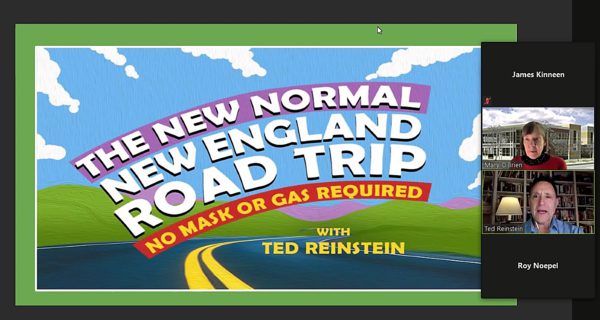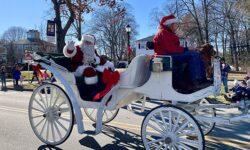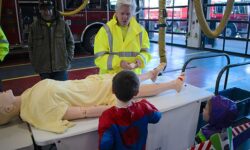Ted Reinstein designed the talk over the summer, knowing libraries would be desperate for virtual content.
By James Kinneen
Hometown Weekly Reporter
On Thursday night, local author and television personality Ted Reinstein presented his live slideshow presentation “The New Normal New England Road Trip” via Zoom to anyone who’d signed up for the event sponsored by the Friends of the Walpole Library. Free to the public, the event was created over the summer and designed to be presented virtually, since Reinstein understood libraries would be in need of good, digital content. By and large, it focused on, or ahem, Chronicled, some of the oddities New Englanders take for granted.
To that end, Reinstein initially noted how unique New England’s geography is, in that it’s a place where mountains and the ocean are so close to each other. Outside of Northern California, he explained, in the continental United States, this unique geographic tandem only exists in New England.
The idea of the “road trip” was to begin in Boston and move North, so Reinstein set out by talking about his North Shore hometown, Winthrop, MA. The unique thing about Winthrop is how close it is to Logan Airport - so close, in fact, Reinstein said when he played baseball as a kid, he swore he could see faces in the airplane windows. He explained that while you could never build an airport this close to a city now, when Logan Airport was built, it was really only servicing small prop planes, as the jet had not yet been invented, so its proximity to Winthrop wasn’t as big a deal.
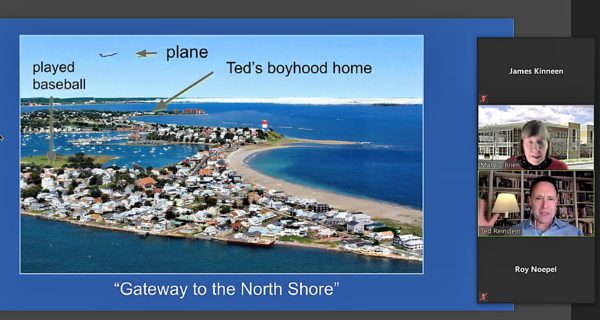
Next, he talked about Cape Ann, the “other Cape,” and joked: “if you say on a Friday afternoon, 'I’m going to the Cape this weekend,' nobody in history has ever asked ‘which one’?” Still, Rockport does have its famous “Motif #1,” which appeared on the cover of his first book (his publisher’s choice, not his; he thought it made it look like a cookbook), but when he used his journalistic skills to ask a fisherman what the far less famous white building was behind the red “most often painted building in America,” disappointingly his big scoop fell through. It’s just “Motif #2.”
While New England may be most famous for lobster, Reinstein talked about our other famous shellfish delicacy, fried clams, which were reportedly invented when “Chubby” Woodman tried to fry a clam and found it to be rubbery and gross. So why do we have them, today? His wife tried it, told him to batter it, and suddenly a New England staple was born. But if you think there’s a “clam war” between the three most famous fired clam joints on the North Shore, he said it’s all for show. They’re all actually good friends and will send clams to each other if one of them ever runs out.
Heading “down East to Maine” from Boston, (another New England thing he noted the oddity of, heading “down East” to arrive somewhere North of Boston) Reinstein noted the beauty of the sliding rocks at Pemaquid Point in Bristol, Maine, and claimed the best clam chowder in New England came from a trading post he found in Brunswick.
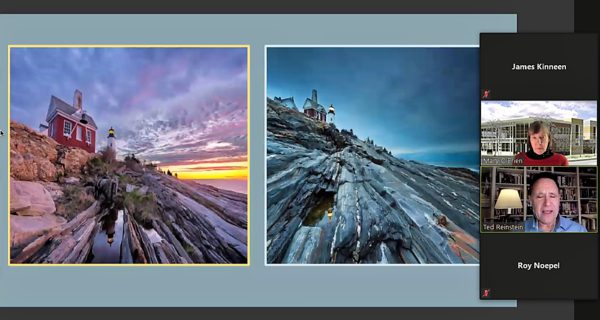
Moving to New Hampshire, Ted talked about the White Mountains, and how the road up Mount Washington, which he and a terrified “Chronicle” camera man drove up together, actually predates the Civil War. Most of the Granite State portion, though, was about the Old Man of the Mountain. Ted spoke of how seeing it was an experience, since you could only see the figure from the street, at a certain angle. Thus, most people’s experience was a dull drive followed by an excited few seconds of “look, look at it there” from their parents. This is because it was actually a bunch of different rock formations, which looked nothing like an old man when seen from the other side, or from below. Once the formation fell apart, a toy designer named Ron Magers created a profile of inverted hockey-stick-looking poles, so that from the right angle, it looks like the old man is still up there. Other New Hampshire highlights included the question of when a transplant becomes a New Englander, which local author Rebecca Rule decided was when “the last person who knows you moved there dies,” and a highlighting of the community-run Northeast Slopes.
Making his way back down to the Berkshires, Ted talked about Norman Rockwell and how he often used real people as models in his paintings. In “New Kids in the Neighborhood,” he used a young Wray Gunn (Reinstein commented on the coolness of the 1950’s sci-fi sounding name) to represent the youngest son of a Black family moving into a new town. Gunn would actually give tours of the Norman Rockwell Museum in Stockbridge, which Reinstein compared to “if Whistler’s mom gave tours of the Louvre.”
When pressed on what it was like to walk by a famous painting you’re actually in everyday, Gunn told Reinstein: "It’s kind of cool to know there’s one place in the world where you’re forever thirteen,” which is why there was a chapter in Reinstein’s first book all about Gunn and Rockwell titled “Forever Thirteen.”
Rhode Island and Connecticut received brief mentions, with notes about just how small Rhode Island is, as well as their famed “coffee cabinet” drinks, while Connecticut focused largely on the state's pizza.
But for as much as he knows about New England, in the Q and A period, Reinstein’s Walpole knowledge failed him. One viewer noted that while New Hampshire once had “the old man of the mountain” Walpole still has Dog Rock. But Reinstein had never heard of our town’s famed Snoopy spray-painted boulder. Ever the New England student, he said he would look into it.
But it won’t be for his new book. Reinstein is ditching New England trivia, history and food for baseball in his next work, which will be titled “Before Brooklyn: The Unsung Heroes Who Broke Baseball’s Color Barrier.” It will document all the people who tried to desegregate baseball and chipped away at the color barrier before Branch Rickey signed Jackie Robinson.
While it may be a while before you can go for a cruise along the New Hampshire coast stopping at diners and dive bars along the way, on Thursday night, Ted Reinstein made sure whenever you eventually can, you’ll know where to go.



